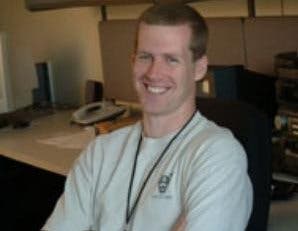Independents' Day
Eurogamer speaks to the developers trading blockbuster studios to pursue the indie dream.
"I wanted to develop the concepts I had floating around in my head and I wanted to make games that haven't been made before," says Burns, explaining his decision to quit Bungie and pursue his own path with music game Planck. "You don't get to be very creative on these big games. There was a certain amount of disillusionment with the big game process too, in all honesty. There was a point – some time after I convened a meeting of over ten people, all with their own excruciatingly bad ideas, to "figure out the story," and I got yelled at for not including enough people – when I realized just how un-fun trying to manage a large team can be sometimes."
"It's really a great feeling to be able to adapt the gameplay so quickly and flexibly as you go along and discover what is fun about the game," explains Broadbent, whose first release, The 2D Adventures of Rotating Octopus Character was released on PSN in early June. "The ability to make huge gameplay and technical decisions without needing to write it all up, justify it to producers, maybe even call the publisher... it's so liberating. For example, a few days before submission I leapt out of bed at 3am and decided I had to implement a mid-air jump-cancel move. On trying it, this move was promptly scrapped at 3.15am, but the ability to try it just made me all the more confident in what we had."

For Schneider, who has released a slew of popular titles on the Xbox Indie Games Channel under the Radiangames moniker, it's been about getting a more rounded experience of the journey a game takes from conception to release. "It's refreshing being able to connect directly with the fans, press, and community again. It's a new adventure, a new challenge, and, of course, you get all the glory," he laughs. "On the downside, you also get all the pressure to do well, and all the blame when things don't work out."
For a generalist like Burns, the chance to break free of the traditional restrictions that a formal creative role imposes has been a real benefit of striking out. "I like to work on a wide variety of things (I've had jobs doing art, music and writing) so it's great to work on something where I'm not boxed into any single discipline."
There are, however, some drawbacks. "One of the negatives is the uncertainty," says Burns, "you don't always know where your next paycheck will come from - although it could be argued that working in a big studio is no less uncertain, given how often layoffs and studio closures occur. On a game like Halo or Call of Duty there's plenty to worry about, but hoping you can pay the rent next month isn't usually one of those things."

Money is both a burden and a motivator as an independent developer. With success stories such as Angry Birds and Minecraft, there's no shortage of me-too upstarts trying to replicate huge earners. But for Burns, it's less of a goal than you might expect. "I think some people get into indie development thinking that they will make a lot of money based on these crazy outlier examples, not taking into account the thousands upon thousands of really cool games made by small teams that have never made their money back," explains Burns. "But one hopes that people are going indie in order to do stuff that's new and interesting and stands out from the crowd. In business terms, Shadegrown Games is more about trying to answer the question of whether we can sustain ourselves by making the games we want to make and making them the way we want to make them."
Schneider, whose suite of Xbox Indie twin stick shooters have found critical acclaim, agrees, but freely admits that the financial pressures of working as an independent entity are real and often relentless. "I have few regrets apart from the fact that my initial plan wasn't a big success. Going solo was definitely the right decision for me, but I think I could have focused a little more on coming up with a plan to make money first, then one to do what I want second. I wish I had known that a $1 price point wasn't going to work out all that well for my titles, so I could have made the games a little deeper and unique and gone for $5 instead. But these are lessons along the way to the ultimate goal: to get to the point that I can take my time and make the games I want. I think that's all most game developers really want professionally."








